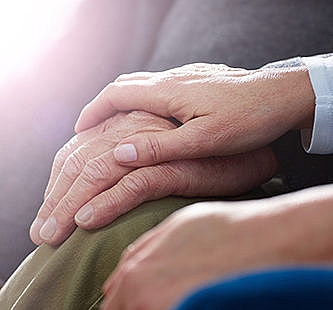At a workshop sponsored by the North Shore Palliative Care Program, I learned the benefits and drawbacks of providing end of life care in your own home to someone you love.
“A palliative diagnosis is a gift,” said the nurse who led the workshop. “It’s time to build a legacy, reconcile with family, say what you’ve always wanted to say, and be creative with the precious time you have left – if you approach it thoughtfully.” She also said that an “end stages” diagnosis is a journey that offers people a chance to make the most of life and prepare for death.
She was comparing the diagnosis of a terminal illness to a sudden death, such as being hit by a car. Some people would prefer to go quickly, while others want the chance to say good-bye, tie up loose ends, and end their life with thoughtful planning.
Are you’re thinking of taking care of someone you love who wants to die at home? Here are several pros and cons (benefits and strengths) of end of life care at home, from this hospice nurse.
Benefits of Providing End of Life Care in Your Home
Avoids the disappointment of not getting a hospice bed. The reason the palliative care program exists is because we are running out of hospital and hospice rooms. If you prepare to take care of a loved one at home, you won’t be disappointed to learn that the wait list for a hospice bed is years long.
Support from a specialized palliative care team. I live in North Vancouver, home of the North Shore Hospice Society and the Palliative Care Program. Their team includes a palliative doctor, palliative liaison nurse, social worker, physiotherapist, occupational therapist, chaplain, patient and family support counsellor, patient care coordinator, music therapist, and a volunteer coordinator.
Palliative nurse and doctor visits. Specialized health care practitioners visit your home, supporting you in any way you need (ideally!). They help with medications, such as teaching you how to administer prescription drugs through ports. The nurse brings a mini-pharmacy when she visits, and can call the doctor for an emergency prescription of the medicine you loved one needs. This saves you a trip to the pharmacy.
Your loved one can die in peace, at home. Not many people want to die in an institutional setting such as a hospice, hospital, or care facility. You know your loved one’s habits, quirks, favorites, lifestyle, etc – so you might be the best one to provide end of life care. Home might be the most natural, comfortable place to die (although this is also a con of end of life care at home!). Spirituality in palliative care might also be easier to address.
Knowledge that your loved one received loving care until he or she died. Some people feel guilty that their loved ones live out their lives in a hospice or hospital. If you provide end stages care at home, you can rest knowing that you did all you could to help your loved leave this world peacefully and comfortably, embraced by familiar people and surroundings.
Continuous care for your loved one. Almost all hospitals and some hospices have an aggravating lack of continuity of care – the doctors and even some nurses are always different! Every week, someone new is taking care of your loved one. Providing end of care support at home will ensure consistency in care.

“End of Live Care at Home” image via Wikimedia Commons
More control, choices, and freedom to make decisions. If you’ve ever been in a hospital, hospice, or care facility, you know that there is very little control or choice for the patients. At home care gives you more freedom, from what to feed your loved one to what to watch on tv.
Some home care support. There is no guarantee you’ll get home care workers to assist or relieve you, but this palliative nurse said that some patients get up to four hours a day of free assistance from a health care practitioner. This home care support depends on the patient, illness, and even the organization that offers the palliative care program.
More positive outlook on death and life. The palliative care nurse said end of care support at home brings positive feelings of dying, for both the patient and the family.
Drawbacks of Home-Based End of Life Care
Feelings of anxiety, fear, and inadequacy. This is probably one of the biggest drawbacks – for me personally – of taking care of a dying loved one at home. I know I’d be nervous about medications, feeding, changing, etc. I’m not a natural nurse, and I don’t know if I could care for my husband or mother at the end of their lives.
A completely consuming, overwhelming “job.” If your loved one is quite ill, he or she may need constant care. If she lives for months or even years, you may feel like your caregiving role will never end. This can negatively affect your mental, emotional, physical, and spiritual health.
If you are considering providing end of life support for a loved one, read Dying at Home: A Family Guide for Caregiving. It’s a Johns Hopkins Press Health Book, and can help you navigate the muddy waters of a loved one dying at home.
Lack of support or help. I’ve participated in many support groups for caregivers, and I know that not all family members participate equally when caring for an ill loved one. If you’re providing end of life care at home, you may find yourself resenting family members who don’t do as much as you do.
Private home care agencies are expensive. It is so important for us to plan for our loved one’s and our own end of care as early as possible – financially, mentally, and spiritually! It’s expensive to hire home support workers to provide palliative care, and we don’t want to use our retirement money so we can take a break. It’s very difficult, and can seem overwhelming to care for a loved one at home until she dies.
Dysfunctional family dynamics. The palliative nurse said that sometimes it’s better for a patient to live out her remaining weeks or months at a hospice, because the family dynamics are hostile, angry, or negative. The last thing a person at the end of her life needs is tension at home, right?
Unsuitable home environment. Some houses, condos, or apartments simply aren’t equipped to house a palliative patient. This makes dying at home very difficult, or even impossible.
The scary news is that even if the cons of end of life care outweigh the pros, this is something I think we’ll all have to face. We’re aging fast, and the health care system doesn’t have the resources to take care of all of us. I’m sorry to end on such a depressing note, but I feel like this is the bottom line.
What do you think about taking care of a loved one at home, as she or he dies?





